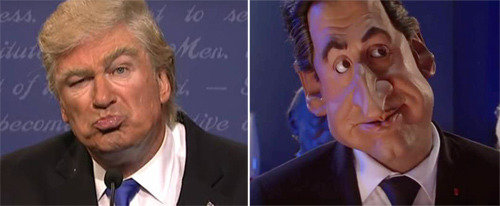A backlash to Trump’s blame on SNL
A backlash to Trump’s blame on SNL
Posted February. 11, 2017 07:06,
Updated February. 11, 2017 07:17

A man, who looked like Donald Trump, then Republican candidate, stood on the stage of “Saturday Night Live” in October last year, a month before the presidential election. Along with protruding lips and the attitude of cutting debate, he reminded the audience and viewers of Trump, but It was Hollywood actor Alec Baldwin’s impersonation of Trump.
It could have been a satirical parody of Trump. However, it created a huge buzz after the show was aired when Trump became furious publicly at his portrayal at the show. Trump tweeted in last December that “Saturday Night Live is unwatchable and totally biased." However, Americans criticized at Trump’s angry tweets that Trump could not even tolerate satirical comedy. “Trump isn’t the first president ‘Saturday Night Live’ has skewered. But Trump is the first president to feud with the show,” said The Washington Post.
In the U.S., a television show for political satire has long been one of the major areas of popular culture. Since Jon Stewart took over the Daily Show as a new host in 1999, the show has become famous for inviting famous politicians and making fun of them in a studio. Former U.S. President Barack Obama and former Secretary of State Hillary Clinton also appeared at the show. It might be a little discomforting, but the show has been one of the most popular television shows that many American politicians want to take part.
Television show for political satire is not only popular in the U.S. but also in Western counties where democracy has matured.
In France, which is a nation famous for tolerance, a television show entitled “Les Guignols de l'Info (news puppets)” has been popular among the French for making political jokes. Politicians are criticized as a puppet on the show by a remark full of cutting sarcasm. The show obviously has a notorious reputation among French politicians.
When the television channel announced the end of the political puppet show in July 2015, the station had to deal with nationwide objections. Former President Jacques Chirac also joined the public to save the show.
“Politicians, who became a target of satirical mockery of the show, may not feel good about it. However, the show has played a meaningful role in the world of France’s news and political comments,” said Claude Bartolone, head of the lower house of parliament in France. The plan to cancel the show was nullified and the show remains as one of the most beloved television shows in France.
“In a broad term, comedy is a part of press and freedom of expression should be protected,” said pop culture critic Kim Eun-young. “The level of satirical parody is high in a nation where freedom of expression is well protected from the political community.”
Won-Mo Yu onemore@donga.com







